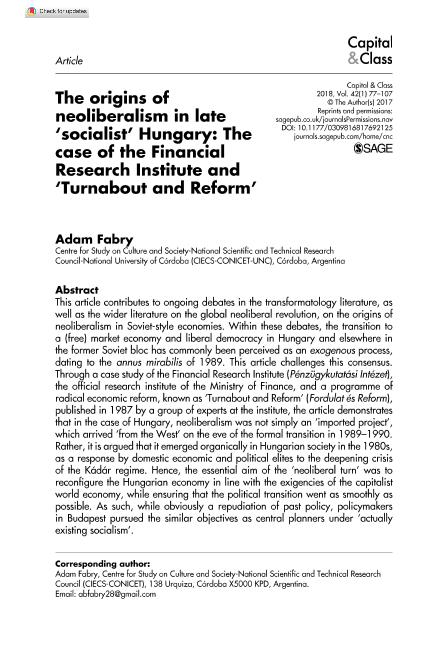Mostrar el registro sencillo del ítem
dc.contributor.author
Fabry, Balazs Adam

dc.date.available
2019-11-20T13:09:04Z
dc.date.issued
2018-02
dc.identifier.citation
Fabry, Balazs Adam; The origins of neoliberalism in late ‘socialist’ Hungary: The case of the Financial Research Institute and ‘Turnabout and Reform’; SAGE Publications; Capital and Class; 42; 1; 2-2018; 77-107
dc.identifier.issn
0309-8168
dc.identifier.uri
http://hdl.handle.net/11336/89253
dc.description.abstract
This article contributes to ongoing debates in the transformatology literature, as well as the wider literature on the global neoliberal revolution, on the origins of neoliberalism in Soviet-style economies. Within these debates, the transition to a (free) market economy and liberal democracy in Hungary and elsewhere in the former Soviet bloc has commonly been perceived as an exogenous process, dating to the annus mirabilis of 1989. This article challenges this consensus. Through a case study of the Financial Research Institute (Pénzügykutatási Intézet), the official research institute of the Ministry of Finance, and a programme of radical economic reform, known as ‘Turnabout and Reform’ (Fordulat és Reform), published in 1987 by a group of experts at the institute, the article demonstrates that in the case of Hungary, neoliberalism was not simply an ‘imported project’, which arrived ‘from the West’ on the eve of the formal transition in 1989–1990. Rather, it is argued that it emerged organically in Hungarian society in the 1980s, as a response by domestic economic and political elites to the deepening crisis of the Kádár regime. Hence, the essential aim of the ‘neoliberal turn’ was to reconfigure the Hungarian economy in line with the exigencies of the capitalist world economy, while ensuring that the political transition went as smoothly as possible. As such, while obviously a repudiation of past policy, policymakers in Budapest pursued the similar objectives as central planners under ‘actually existing socialism’.
dc.format
application/pdf
dc.language.iso
eng
dc.publisher
SAGE Publications

dc.rights
info:eu-repo/semantics/openAccess
dc.rights.uri
https://creativecommons.org/licenses/by-nc-sa/2.5/ar/
dc.subject
FINANCIAL RESEARCH INSTITUTE
dc.subject
HUNGARY
dc.subject
MARKET REFORMS
dc.subject
NEOLIBERALISM
dc.subject
SOVIET BLOC ECONOMIES
dc.subject
STATE CAPITALISM
dc.subject
TURNABOUT AND REFORM
dc.subject.classification
Ciencias Sociales Interdisciplinarias

dc.subject.classification
Otras Ciencias Sociales

dc.subject.classification
CIENCIAS SOCIALES

dc.title
The origins of neoliberalism in late ‘socialist’ Hungary: The case of the Financial Research Institute and ‘Turnabout and Reform’
dc.type
info:eu-repo/semantics/article
dc.type
info:ar-repo/semantics/artículo
dc.type
info:eu-repo/semantics/publishedVersion
dc.date.updated
2019-10-24T18:19:59Z
dc.identifier.eissn
2041-0980
dc.journal.volume
42
dc.journal.number
1
dc.journal.pagination
77-107
dc.journal.pais
Estados Unidos

dc.journal.ciudad
Los Angeles
dc.description.fil
Fil: Fabry, Balazs Adam. Consejo Nacional de Investigaciones Científicas y Técnicas. Centro Científico Tecnológico Conicet - Córdoba. Centro de Investigaciones y Estudios sobre Cultura y Sociedad. Universidad Nacional de Córdoba. Centro de Investigaciones y Estudios sobre Cultura y Sociedad; Argentina
dc.journal.title
Capital and Class
dc.relation.alternativeid
info:eu-repo/semantics/altIdentifier/url/http://journals.sagepub.com/doi/full/10.1177/0309816817692125
dc.relation.alternativeid
info:eu-repo/semantics/altIdentifier/doi/http://dx.doi.org/10.1177/0309816817692125
Archivos asociados
